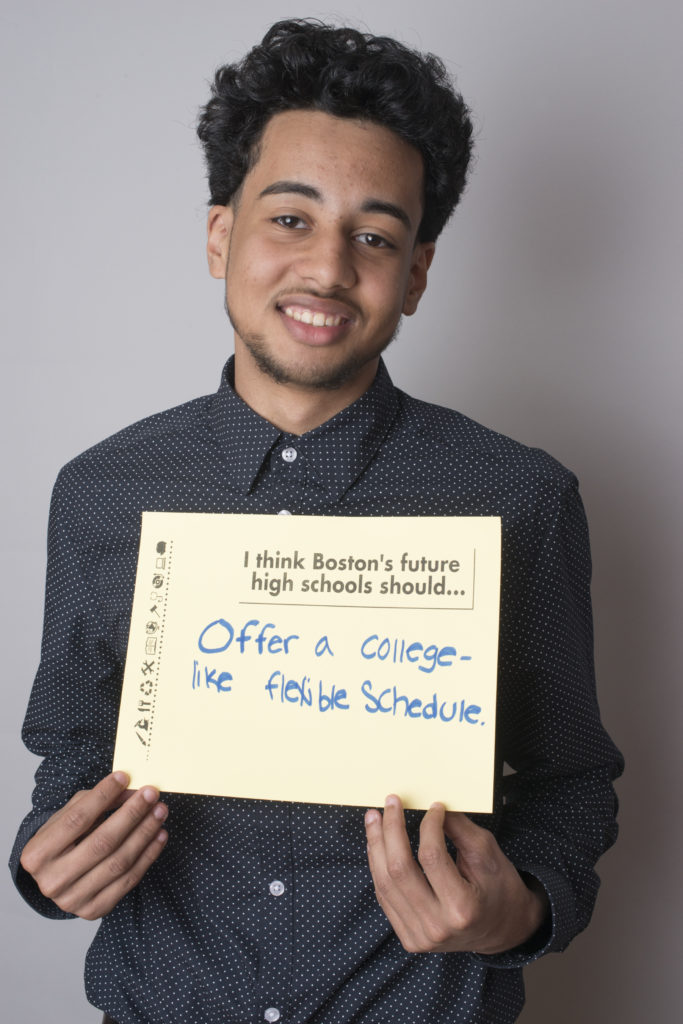
By Francisco Santos
Our high schools in Boston have a problem: their schedules. Students don’t have enough time in the day to juggle all their responsibilities. That’s the sad truth, and what’s worse is that they have to choose between school-work and other responsibilities like sports, having a job, or going home to help support their families. As a high school student in Boston I have experienced this personally. At times, I have questioned my own decision making because I have chosen to participate in sports instead of completing my homework. This turns into a cycle where I choose sleep over school. Eventually, all motivation is lost to do well because catching up with the work seems like too much. To solve this detrimental cycle high schools need a new, more flexible format to their schedules.
I interviewed Michelle Stauss, Housemaster at Newton North High School, about their open-campus policy which allows some students to go off campus during the school day.
Francisco: Do you think the attitudes of [students] here change when they’re allowed off campus?
Michelle: We start doing our open-campus program at the second-semester-sophomore point, and it is something we view that [students] have to earn. I think some students just think of it as kind of a given because they’re doing the right things and earning the privilege. In terms of does their attitude change, towards school, do you mean?
Francisco: Yeah, like towards their schoolwork.
Michelle: I think definitely it depends on the individual but I do think for some kids it’s very tricky to balance the freedom with the responsibility.(That’s the way we like to phrase it at our school.) A lot of the students love the flexibility of choosing whether or not to stay in the building to do some schoolwork or go outside to get fresh air, or go down the street into Newtonville to get a bite to eat or something to drink, or even to take a walk with a friend.
Francisco: Okay, and do you think a later start time would hinder or help your students here?
Michelle: Well, that’s a great question because that’s something that’s being studied right now in our school district. In fact, later I’m going to be taking a survey about that, and a lot of research points to a later start time being better and healthier for high school students because of their circadian rhythms and what science and biology tells us about their bodies and development. I know there’s a line of thought that some people believe it might cure some form of tardiness. I don’t really buy into that piece because I feel like sometimes when we move a start time later it doesn’t solve whatever the reason was that a student was tardy, but I think on the whole that a lot of our students are staying up really late to do their homework and spending multiple hours on homework into the wee hours of the morning. And because research and science show that a later start time would be healthier for students, that is one reason that I think considering a later start time is useful.
Francisco: If there is one, what is the most brought-up issue students have with the scheduling of going off campus?
Michelle: I think the topic that’s most frequently raised is the volume of homework they have and being able to manage their time, and being able to successfully get all their homework done. A lot of students have heard that we’re looking at volume of homework, type of homework. We have a lot of conversations about homework, workplace stress, emotional health—those are topics that are brought up a lot with students. Students do recognize the fact that we are both pushing them to do well and achieve at high levels and be ambitious, and we are also trying to stress to them the importance of being healthy and seeking a balanced workload and not taking on too much so that they can stay on top of the work, so everything is manageable and so they stay emotionally healthy. They are at a competitive school with a lot of personal pressure they put on themselves, and a lot of parental and community pressure to do well, achieve at certain levels, and to get into certain schools.
Francisco: Is there anything you would add?
Michelle: I think the one thing I would say is that open campus has helped our students manage their time, and often we’ll hear from alumni who say that being a student at our school has helped them figure out how to balance time in a way that was useful for them in their first semester in college. What’s tricky about deciding if a school district or school system should do open campus or not is that I don’t think it’s for all schools or all school systems. The reason I say that is I have worked in other schools and systems where safety issues were a concern. When that came into play there would have been more concern about safety. Safety is the first concern for any school––number one even above teaching and learning.
You must be logged in to post a comment.